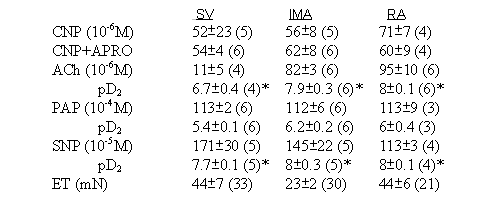| pA2
online © Copyright 2003 The British Pharmacological Society |
034P
University of Surrey Summer Meeting June 2003 |
C-type
natriuretic peptide relaxes human coronary artery bypass graft vascular
conduits preconstricted by endothelin-1
|
Print abstract Search PubMed for: |
Endothelin (ET) is a potent
vasoconstrictor implicated in early graft spasm following coronary artery
bypass grafting (CABG). We assessed the ability of the endogenous endothelium-derived,
nitric oxide independent vasodilator C-type natriuretic peptide (CNP)
to reverse prior constriction of vascular conduits commonly used for CABG
surgery. We also assessed whether local vascular proteases significantly
limit the bio-availability of CNP.
Segments of human saphenous vein (SV), internal mammary artery (IMA) and
radial artery (RA) were removed from patients undergoing cardiac surgery
(n=34, age 64±2 S.E.), mounted in isolated organ baths and pre-constricted
with 10-7M ET. The ability of increasing
concentrations of CNP (with or without aprotinin [APRO], 1000U/ml), to
reverse contraction induced by ET was compared with the endothelium-dependent
dilator acetylcholine (ACH; 10-9 to 10-4M),
the endothelium-independent dilator sodium nitroprusside (SNP; 10-9
to 10-5M), and papaverine (PAP; 10-9
to 10-4M). All drug responses were expressed
as a % of constriction by ET, and statistical comparisons made by 2-way
repeated measures ANOVA.
Table 1: pD2 (-log EC50),
maximum (%) vasorelaxation, and maximum constriction to ET (mN), in SV,
IMA and RA.

Mean ±SEM, N
in parentheses. * p<0.05 for PAP vs ACh or SNP for pD2,
t-test.
CNP significantly relaxed ET pre-constriction in all vessels studied (F=17.8,
36.3 and 48.4 respectively; p<0.001). Aprotinin did not significantly
affect the CNP concentration response curves in SV (F=0.012, p=0.92),
IMA (F=0.79, p=0.42) or RA (F=2.06, p=0.25). ACh relaxed SV weakly, with
maximal relaxation at 10-8M and reconstriction
at higher doses. Papaverine completely relaxed all vessels at the highest
concentration, but responses were less sensitive than to SNP or ACh.
CNP significantly reverses ET-induced constriction in both arterial and
venous conduits routinely used for CABG. Proteolytic breakdown of CNP
by local vascular enzymes appears of little importance. CNP may act as
an endogenous mediator to limit peri and post-operative spasm following
CABG surgery. Strategies to induce CNP release in situ might therefore
result in improvement of graft function post-operatively.